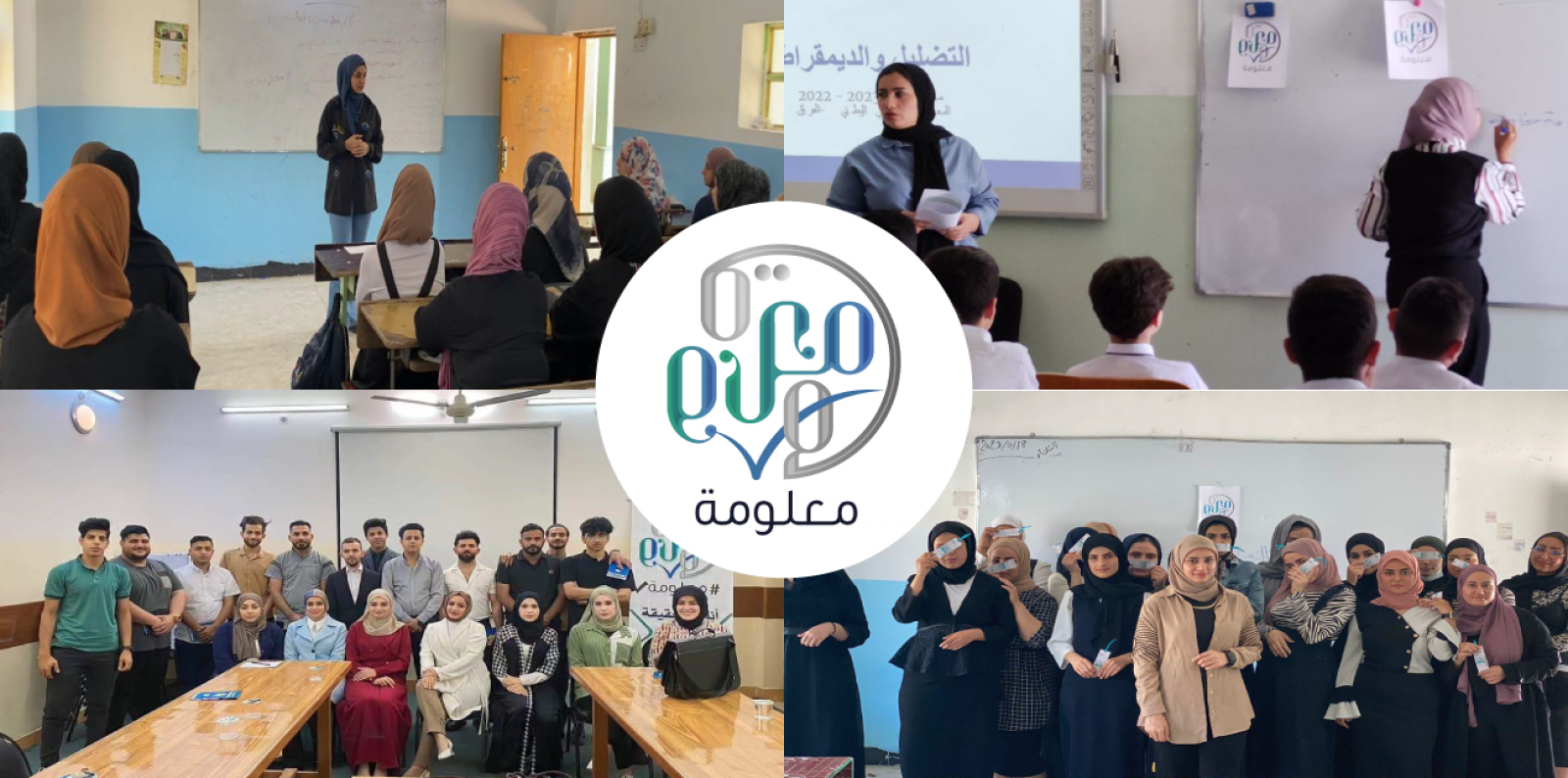
SHARE
The online and social media space has transformed the information landscape over the last decade. Platforms such as Facebook and Twitter have become a hub for citizen engagement, creating opportunities for active citizens to collaborate in pursuing change. Despite this, the online space is also being used to disrupt the integrity of information, and undertake cybersecurity attacks that add to existing tensions across the Middle East and North Africa (MENA) region. In the face of these issues, citizens and activists are looking for support, resources and tools to respond to challenges in the information space and continue effecting the change they seek in their society.
To respond, in late 2022, the National Democratic Institute (NDI) launched the "Maalumah Sah" (“Correct Information”) program, a pilot initiative designed to train 25 Iraqi citizens across 10 provinces on topics related to information integrity, civic education and media literacy. This program utilizes a training of trainers approach (ToT) where 25 participants implement what they have learned by creating public and online awareness raising campaigns and organizing activities with university students, civil society organizations (CSOs) and youth group participants that focus on issues related to information integrity. The strategy of the ToT approach further generates awareness and educates Iraqi CSO leaders, activists, journalists and lawyers, at the local level, on the need for information integrity to better inform society.
The "Maalumah Sah'' program held its first in-person training in March in Baghdad focused on misleading information, its impact on democracy and digital rights and tools that can be used to identify and fact-check. Through group exercises and roundtable discussions to encourage collaboration among participants, NDI provided participants with practical online resources that they could apply to combat misleading information, as well as classroom opportunities to build connections to the larger themes of media literacy and information integrity. At the end of the session, NDI worked with participants to craft their own action plans outlining the next steps to promote information integrity in their communities.
Following the workshop, the ToT participants implemented their own activities in their respective communities to train others on key information integrity topics. NDI worked with these trainers to establish a common foundation of knowledge on the Iraqi information landscape as a prerequisite to help them ultimately design and implement initiatives related to supporting information integrity in Iraq.
One training organized in Babil, Iraq, aimed to raise awareness among civil society activists, sheikhs, tribal leaders, and religious and community figures on the threats to information integrity. This training focused on how participants can safeguard themselves against misleading information on social media platforms. Participants learned about the factors that negatively impact the information landscape, including how misleading information can harm one’s personal life and professional career. During the training, participants gained strategies that they could apply to verify and fact check news from a variety of sources, publications and websites. The training inspired participants to pursue actions in their local communities. Religious clerics promised to address the explained concepts during their weekly Islamic Friday prayers. Babil’s tribal leaders pledged to educate community youth members on information integrity, and provincial government officials expressed interest in organizing further awareness-raising activities within cities and public offices.
Another ToT participant in Kirkuk took a more unique approach by organizing a theatrical play to raise awareness on key information integrity topics they learned under “Maalumah Sah.” The play is based on a short plot involving a father and his son learning about the dangers of misleading information. The play depicts how easily misleading information can spread and be used to manipulate others. Through the play, youth participants and attendees gained knowledge of the threats to Iraq’s information environment, and learned about the implications of such actions on local communities, as well as its significant impact on security and democracy. To encourage active engagement in combating the spread of misleading information, the play was performed in the presence of government stakeholders, notably the mayor and police chief of Kirkuk, as well as tribal and provincial leaders.
Activity leaders play impactful roles in their respective communities by reaching out to underrepresented segments of the population, including women and youth, and in conservative and tribal communities that are often overlooked by local and international non-governmental organizations. By engaging with citizens throughout Iraq, the "Maalumah Sah'' program has encouraged both young men and women in Iraq to become leaders in their communities and experts on the topic of information integrity. Through this program, NDI was able to reach over 400 students, through its activity leaders, across Iraq. The program seeks to continue strengthening the awareness and capabilities of citizens in Iraq in addressing issues related to information integrity and building individual resilience against threats to the information space.
Author: Amer Ammache is a Program Associate with the Middle East and North Africa team at NDI.
NDI’s engagement with this program is implemented with the support from the National Endowment for Democracy (NED) program.
###
NDI is a non-profit, non-partisan, non-governmental organization that works in partnership around the world to strengthen and safeguard democratic institutions, processes, norms and values to secure a better quality of life for all. NDI envisions a world where democracy and freedom prevail, with dignity for all.


